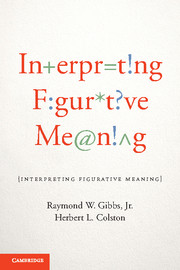Book contents
- Frontmatter
- Contents
- 1 Introduction
- 2 Identifying Figurative Language
- 3 Models of Figurative Language Comprehension
- 4 Interpreting Specific Figures of Speech
- 5 Indeterminacy in Figurative Language Experience
- 6 Factors Shaping Figurative Meaning Interpretation
- 7 Broadening the Scope of Figurative Language Studies
- References
- Index
2 - Identifying Figurative Language
Published online by Cambridge University Press: 05 June 2012
- Frontmatter
- Contents
- 1 Introduction
- 2 Identifying Figurative Language
- 3 Models of Figurative Language Comprehension
- 4 Interpreting Specific Figures of Speech
- 5 Indeterminacy in Figurative Language Experience
- 6 Factors Shaping Figurative Meaning Interpretation
- 7 Broadening the Scope of Figurative Language Studies
- References
- Index
Summary
What defines “figurative language” as opposed to any other kind of speech? Consider the opening paragraphs of the following article from the Good Times, a Santa Cruz, California news and entertainment weekly (November 4–10, 2004, p. 8). The article is titled “David vs. Goliath: Round One,” and describes the University of California, Santa Cruz's controversial plan to increase enrollment by more than 6,000 students. Read through the following text and pick out those words and phrases that appear to express figurative meaning.
Hidden in the shadows of a massive election year, tucked under the sheets of a war gone awry and a highway scuffle, another battle has been brewing.
When UC Santa Cruz released the first draft on its 15-year Long Range Development Plan (LRDP) last week, it signaled an ever-fattening girth up on the hill. While some businesses clapped their hands with glee, many locals went scrambling for belt-cinchers.
The LRDP calls for 21,000 students by the year 2020 – an increase of 6,000 over today's enrollment.…The new enrollment estimate may have startled some residents, but as a whole it merely represents a new stage in a decades-long battle that has been fought between the city and the City on the Hill. While some students are a boon to local businesses and city coffers, many residents complain students are overrunning the town – clogging the streets, jacking up rents and turning neighborhoods and the downtown into their own party playground.…
“The bottom line is that the university can do what it wants to,” explains Emily Reilly, Santa Cruz City Council member and head of a committee developed to open up dialogue between the campus and the city.
These paragraphs are typical of the writing that appears in many newspapers, and most readers understand something of the text's meaning, at the levels of both an individual sentence and the overall message. But picking out the words and phrases that express specific figurative meanings is more difficult. For instance, the first line opens with the phrase, “Hidden in the shadows of a massive election year,” which seems figurative because election years cannot really cast shadows and be physically “massive.”
- Type
- Chapter
- Information
- Interpreting Figurative Meaning , pp. 15 - 57Publisher: Cambridge University PressPrint publication year: 2012



